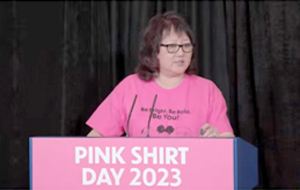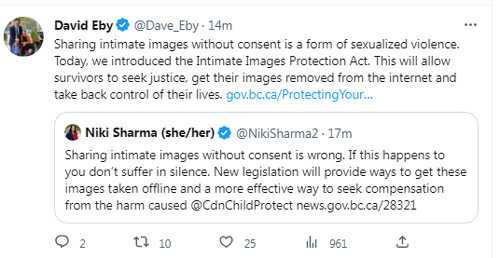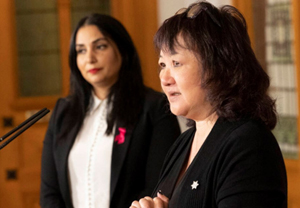
Monday March 6, 2023 | VICTORIA, BC
by Mary P Brooke | Island Social Trends
Today BC’s new Attorney General delivered a bold new direction in protecting citizens in the modern digital age.
Niki Sharma became Attorney General just a few months ago (Premier David Eby’s new Cabinet was announced December 7, 2022). Taking on the scope of what goes on across the Internet — including into the dark web (a subset of the deep web that is intentionally hidden and requires a specific browser) — is a strong statement about what can be done with a mindset for setting things right.

To better protect people from the harmful effects of having their intimate images shared without their consent and improve access to justice for survivors of sexualized violence, the Province of BC is introducing the Intimate Images Protection Act.
“Sharing intimate images without consent is wrong. If this happens to you don’t suffer in silence,” Sharma posted online after her media session. Today Sharma shared the podium with Carol Todd, who has become an activist for online safety following the death of her daughter Amanda Todd who killed herself in response to having been exploited online. She is the founder of the Amanda Todd Legacy Society and a digital literacy education in the Coquitlam School District.
Safe use of the online space:
“The online world has become yet another space which has become an important part of our daily lives,” said Todd in today’s media session. “We should not be afraid of being able to live our lives in either the online or offline world,” she told those listening.

Todd thanked everyone for “continuing to let Amanda’s voice shine through”. And added: “This is the dream of helping kids that she always wanted.”
Primary focus must still be prevention:
“And while it is wonderful to have bills, acts, legislative laws we also have to remember the primary focus of prevention. We also need to remember that the primary focus of prevention is necessary. We have to continue to educational awareness that is necessary to safeguard our children, youth and ourselves in the technology in our world,” said Carol Todd.
Today Carol Todd outlined several ways that parents, teens and others can get more information on the dangers of engaging in online/phone posting of intimate images. That list includes: Common Sense Media, TELUS wise, Media Smarts.
Legislation is a deterrent:
“A big part of introducing legislation like this is a deterrent factor,” said Niki Sharma today.
“We plan in the rolling out of this to really get into the front line of education systems and also front line workers,” she said, “so they (anyone victimized by online sexualized exploitation) can understand the tools that would be available to them online, to access this type of order.”

“Perpetrators or would-be perpetrators can know that they will face consequences when it comes to distributing something that they don’t have consent to do. So of course with that deterrent factor it requires us to push out there with the education and make sure that everybody knows and that’s part of the work that we’re doing all here today.
“Carol’s been doing excellent work and has already offered to help us with figuring out where we need to target that,” said Sharma today.

Resources for teachers & parents:
Carol Todd plans programming and resources for teachers in the school district (SD43 Coquitlam) where she works. “That includes how to be more digital literate, how to be a digital citizen, using the ERASE Program with lots of resources,” said Todd today.
The BC Government’s ERASE website has sections on online safety, mental health and well-being, bullying, racism, diversity, consent, and healthy relationships and boundaries.
“Sextortion exploitation is part of our conversation now, with teachers, with kids. That’s the awareness prevention part. We have that reactionary part once an image is distributed,” said Todd, referring to the legislative approach announced today.
Getting to prevention first:
“But we want to get to that prevention piece first. So that it doesn’t happen. So that it doesn’t go there. So no one is harmed. So no one is traumatized,” she pointed out as counterpoint to the legal enforcement approach announced today.
“Online safety is about connecting with our kids,” says Todd. “And so we want to teach our kids what to do and what to do in case of being asked for images. Talking to strangers online, people they don’t know. Eighty percent of kids out there talk to people they don’t know. Was this a result of COVID? Maybe,” she said today.
“But we have to work hard in order to educate to make our adults aware, to make our parents aware, so they talk to their kids. Make our teachers more knowledgeable so they can talk to their classes of kids. Our province is education through the ERASE initiative programming and every teacher in BC has a digital literacy framework to follow in education with goals about privacy, exploitation, who to talk to, how to become a digital citizen, respect,” said Carol Todd today.
She added: “In my recent and findings, our province has the best framework going for teachers to follow.”
Events and workshops:
The ERASE initiative has been hosting a series of student events. Teachers can register and have their classes go online and watch these presentations.
There are also parent presentations. The next one is March 8 in the evening. “Those are things that our kids need to learn. Find a resource, a link, webinar or session and go and take it,” said Todd.
Another one is on March 27 through UBC Education.
“Take as many training sessions and learn as much as you can. Parents may also wish to visit these websites: Common Sense Media, TELUS wise, Media Smarts.
Taking images offline & getting compensation:
“New legislation will provide ways to get these images taken offline and a more effective way to seek compensation from the harm caused,” the Attorney General said.
Premier David Eby posted on Twitter: “Sharing intimate images without consent is a form of sexualized violence. Today, we introduced the Intimate Images Protection Act. This will allow survivors to seek justice, get their images removed from the internet and take back control of their lives.”
Intimate images shared without permission:
“Having your intimate images shared without your permission is a betrayal that can have devastating impacts,” said Sharma. “Victims are often too ashamed to come forward and those who do are met with limited, complex and expensive legal options. We are building a path to justice for people to regain control of their private images and hold perpetrators to account.”
Incidents of sharing intimate images without consent are under-reported due to stigma, embarrassment and a prevailing presumption that there’s no meaningful avenue for redress. However, research indicates the numbers are increasing.
In 2020, Statistics Canada reported an 80% increase in incidents reported to police of non-consensual sharing of intimate images across the country compared to the previous five years.
Between 2014 and 2020, 48% of youth victims of non-consensual distribution of intimate images were victimized by an intimate partner or a friend. For more than 36% of youth victims, the accused was a casual acquaintance.
Why people create & post these images:
The idea of putting one’s own image onto any digital platform is a practice that might well be discouraged, especially among youth.
If people are lonely and feel they are getting attention or approval by sharing intimate images might require a re-examination of lifestyle choice.
Attempting to gain social acceptance by taking intimate images is something people might want to question to begin with. Pressure from an intimate partner or from peers should not be enough to abandon the sensibilities for undertaking that practice.
But it happens.
“As our lives become increasingly digital, more people are sharing intimate images with each other. But when your intimate images are used against you, that’s a violation of trust that can be extremely difficult to overcome,” said Kelli Paddon, Parliamentary Secretary for Gender Equity. “This legislation is a critical part of our work to better support people impacted by sexualized violence.”
Young people connecting with supports:
“For some young people, the embarrassment and ridicule that can come with the distribution of personal, intimate images can be all-encompassing,” said Carol Todd, whose teenage daughter Amanda died by suicide 10 years ago due to cyberbullying and online sexual exploitation. “I hope this legislation helps young people connect to the supports they need to take back control of their lives and from taking action against crimes, such as sexual exploitation, for such a long time.”
“The effects of having one’s intimate images shared without consent are wide-ranging and long-lasting,” it was stated in the Attorney General’s news release. “Often, people remain trapped in abusive relationships due to a partner’s threats to distribute intimate images. People who have experienced this type of sexualized violence report feeling depressed, humiliated or grief-stricken. The trauma can become overwhelming,” she said.
What’s in the legislation:
The legislation covers intimate images, near-nude images, videos, livestreams and digitally altered images, including videos known as deep fakes. If passed, the legislation will:
- create a new, fast-track process for getting a legal decision that an intimate image was recorded or distributed without consent and ordering people to stop distributing or threatening to distribute intimate images.
- provide recourse for minors to pursue legal action to stop the distribution of their private images and
- will also offer a clearer, legal avenue for lawsuits to seek monetary damages for harms suffered.
The legislation streamlines the process for getting images taken off the internet.
Today the Attorney General said that the onus is taken off the victim and put onto the perpetrator (or the latter’s legal representative presumably, for greater incentive to comply).
The Intimate Images Protection Act is part of a multi-year, cross-government action plan to help end gender-based violence.
Legal and self-help:
To support the legislation, the Civil Resolution Tribunal is working to expand its online portal to help people define their legal issues, provide information on their rights, access immediate self-help tools to begin remedial action and connect to community and mental-health supports.
“If someone shares your private images without your consent or threatens to share your images, you don’t need to be ashamed or afraid,” said Nick Sandor, executive director, Men’s Therapy Centre. “Young men and boys are increasingly finding themselves victims to this type of violence. But I want people to know there are supports available to help you deal with the mental-health impacts and exercise your legal options if you chose to do so.”
===== RELATED:
Pink Shirt Day: Carol Todd encourages kindness messaging in BC classrooms (Feb 22, 2023)









